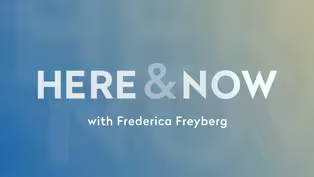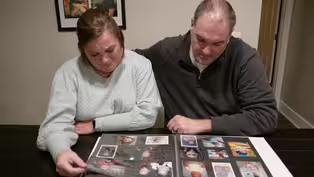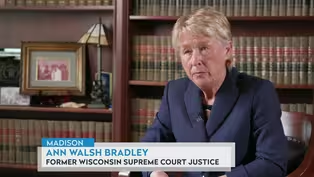Here and Now
Gov. Tony Evers on Signing Wisconsin's 2025-27 State Budget
Clip: Season 2400 Episode 2401 | 6m 54sVideo has Closed Captions
Tony Evers on the 2025-27 state budget deal alongside a federal reconciliation bill.
Democratic Wisconsin Gov. Tony Evers discusses the 2025-27 state budget deal with the Republican-controlled Legislature alongside a federal reconciliation bill and state Supreme Court ruling impacts.
Problems playing video? | Closed Captioning Feedback
Problems playing video? | Closed Captioning Feedback
Here and Now is a local public television program presented by PBS Wisconsin
Here and Now
Gov. Tony Evers on Signing Wisconsin's 2025-27 State Budget
Clip: Season 2400 Episode 2401 | 6m 54sVideo has Closed Captions
Democratic Wisconsin Gov. Tony Evers discusses the 2025-27 state budget deal with the Republican-controlled Legislature alongside a federal reconciliation bill and state Supreme Court ruling impacts.
Problems playing video? | Closed Captioning Feedback
How to Watch Here and Now
Here and Now is available to stream on pbs.org and the free PBS App, available on iPhone, Apple TV, Android TV, Android smartphones, Amazon Fire TV, Amazon Fire Tablet, Roku, Samsung Smart TV, and Vizio.
Providing Support for PBS.org
Learn Moreabout PBS online sponsorship>> Wisconsin has a new state budget signed in the dead of night last week by Governor Tony Evers.
It's the first budget to have bipartisan support since 2007.
Joining us now is Governor Evers.
And thanks for your time, sir.
>> So this has additional funding for special education child care providers and the UW system in exchange for tax cuts.
It sounds like it's an actual compromise budget.
>> Yeah, I would say it was.
And I'm glad it was that way myself.
Over the last year or so, a couple of years, I get out and talk to people all the time.
That's what I spend most of my time doing.
And all across the state, I heard that a lot.
You know, the idea that it'd be great that, you know, everybody knows we're a purple state, that we actually do work on compromise.
And so we were able to do that.
We had some wins and some things that didn't.
But I guess that's kind of the way the politics work.
If you're if you're a purple state like Wisconsin.
>> Now let's go back to the last budget where you used your veto pen to create an ongoing $325 per pupil increase in public education.
But that increase isn't funded in this budget.
And property taxes will taxpayers will pay for it if the school districts decide to levy that amount that they can.
Was that a priority for you to try and get Republicans to fund that, or were there just too many other places for the money?
We wanted both, obviously, but at the at the end of the day, we, you know, we put together a package that was I want to say it's $1.4 billion in spendable money.
And also as you likely remember, part of the problem in the past was the amount of money that school districts had to backfill into special education.
And so now that is less of an issue for them.
And so we put we have the largest increase ever in, in, in that arena.
And so I think it was a good start.
Is it solving all the problems.
No.
And that's the nature of working with the legislature.
And you know, we're a purple state.
And so we're not going to get everything.
But it was a good start.
We had good starts in several areas.
But education we were we made some huge increases in, in in the money for special education.
That helps out in a couple different areas.
Is it solving every problem?
No, but it was a step forward.
Yes.
>> Now negotiations with Republicans stopped and started a few times throughout this process.
And at one point it looked like they were going to go their own way as they've done the last few budgets.
What were out to them?
Were you waiting for them to figure out them and come back to the table?
>> That it was a ladder?
Clearly the two houses weren't on the same page.
And after a while that became less of an issue.
And so they came back and we ended up solving it.
And, you know, we had some really significant wins.
Also.
I, you know, I know the importance of having, you know, both sides having some wins, having, you know, some things didn't work.
But for example, our ability to get more money for our hospitals in the state of Wisconsin, that was huge.
That was a win.
That was a complete win.
And because, as you likely remember, we had two hospitals in Eau Claire closed in one, you know, one year.
And this keeps our hospitals all across the state in a much better place.
>> Now, one reason Republicans did need to compromise.
You talked about the difference in the houses is the Senate couldn't afford to lose any votes in the Republican Party, and that's because Democrats picked up seats in the last election.
So how much does redistricting play into what happened in this budget?
>> Absolutely.
This budget would not have looked anywhere near as positive if it if it wasn't for that, having good maps that are reflective of actually what happens on the ground, that was huge.
And so we'll and we'll, we'll continue to do a good job as far as taking not taking advantage of it, but actually reflecting that.
But you know, from my side to, from the Democratic side, just because we are we have better maps doesn't mean that we can run roughshod over the other side either.
It just won't work.
We're we're as purple as they come in our state as compared to other states, and we recognize that.
>> Let's talk about the Donald Trump's b-b-b big, beautiful bill.
What will be the impact of that bill in Wisconsin?
>> Yeah, I don't think it's going to be good.
You know, clearly, issues that they feel strongly about is not necessarily good for Wisconsin passing this bill kind of makes them all legal.
I think in the past there was some concern that on my part and others that what was what was happening in the new administration was very difficult and frankly, not shouldn't have been able to do that because the Congress has not weighed in.
Well, they've weighed in now.
And so all those things that that we were against, that were happening, happened.
And so, yes, I think it's going to be it's going to be a really difficult time for us.
And, you know, whether it's schools, whether it's just about anything, you know, I'm sure we'll have thousands of people in Wisconsin that no longer have the health care.
They they had before.
>> One area that's still up is your corrections plan.
As far as the prisons, you vetoed the deadline to close the green Bay facility.
Can you use the experience negotiating the bill, the budget, to figure out how to negotiate that plan?
>> Yeah, absolutely.
We should.
And we have to.
I mean, we green Bay is going to close.
I get that whether it's in 2029 or whenever it is closing.
But in order to allow that to happen, there's all sorts of steps.
We put together a plan several months ago, I think it was a rational plan.
And, you know, there are some people that want to do different things.
But the start.
It's like a dance.
We have to do this first and then this first and this first.
I'm willing to talk to any, any Republican, any Democrat on this issue.
We just have to get it done.
Do I think we will?
Yes.
We have to.
>> It's tradition for the governor to wait until after the budget is signed to announce whether they'll run for another term.
What is the timeline for your decision, and do you have any announcements you'd like to make today?
any.
>> Today, but I'll tell you it'll happen shortly.
I would say a week or so.
Here & Now opening for July 11, 2025
Video has Closed Captions
Clip: S2400 Ep2401 | 1m 6s | The introduction to the July 11, 2025 episode of Here & Now. (1m 6s)
Why Two Wisconsin Parents Want to Reform Pharmacy Benefits
Video has Closed Captions
Clip: S2400 Ep2401 | 9m 49s | Wisconsin parents push for changes in how health insurance prices life-saving medications. (9m 49s)
Justice Ann Walsh Bradley on the Courts, Law and Politics
Video has Closed Captions
Clip: S2400 Ep2401 | 9m 5s | Ann Walsh Bradley on serving on the Wisconsin Supreme Court for 30 years. (9m 5s)
Providing Support for PBS.org
Learn Moreabout PBS online sponsorship
- News and Public Affairs

Top journalists deliver compelling original analysis of the hour's headlines.

- News and Public Affairs

FRONTLINE is investigative journalism that questions, explains and changes our world.












Support for PBS provided by:
Here and Now is a local public television program presented by PBS Wisconsin


